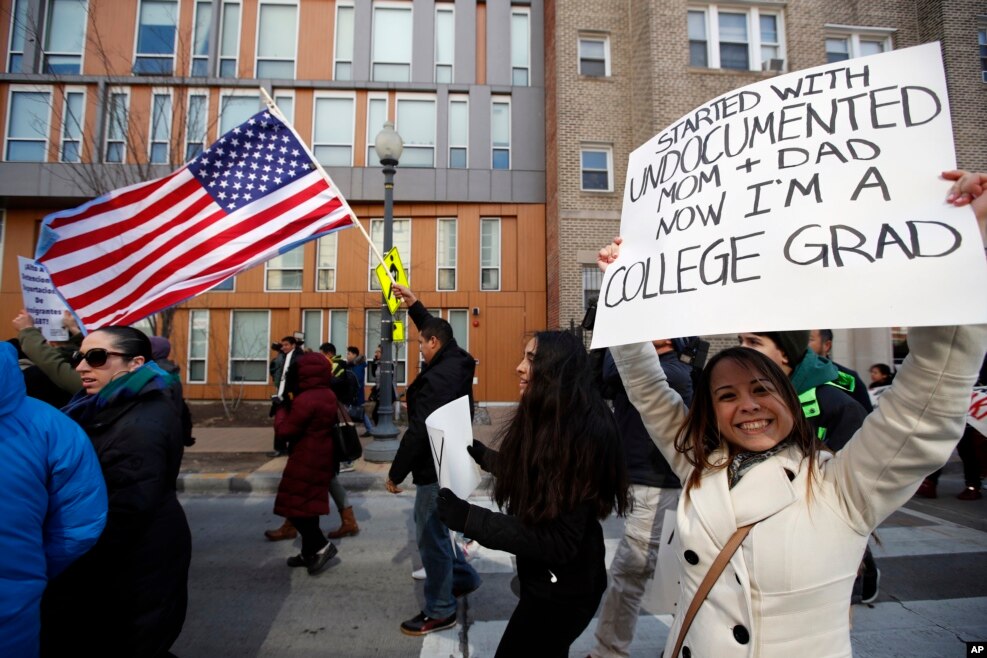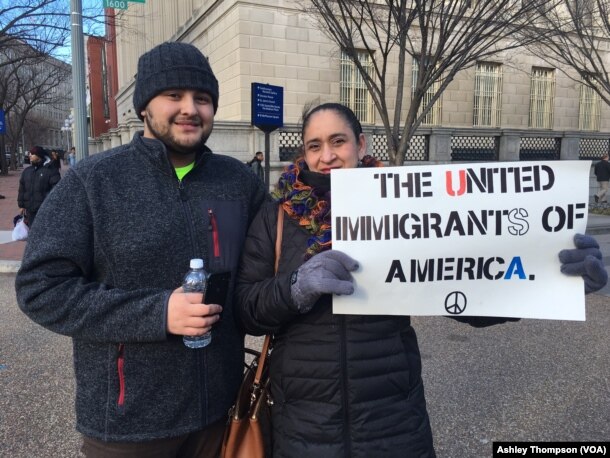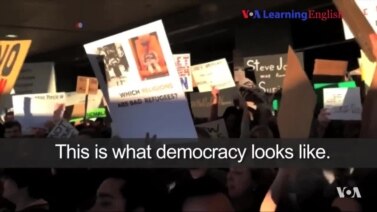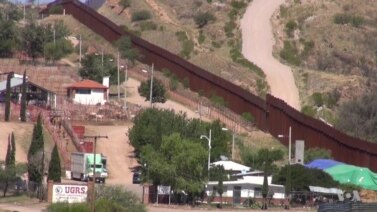
Columbia Heights is the heart of Washington, D.C.'s Hispanic community. The neighborhood's busy streets are lined with popular immigrant-owned businesses, from taquerias to Salvadoran pupusa shops to Latino food markets. But on Thursday some of them were closed.
February 16 marked “A Day Without Immigrants” in the United States.
Immigrants nationwide stayed home from work and school to show that they are important to the U.S. economy and way of life. Restaurants and businesses in major U.S. cities also closed their doors in a show of support for immigrants.
“A Day Without Immigrants” strikes took place in Washington, New York, Philadelphia, Boston, Chicago and other cities.
The protest is in answer to President Donald Trump's administration, which has promised to increase deportation of undocumented immigrants. Trump has also ordered a ban on travelers from seven Muslim-majority countries. And he plans to build a wall along the U.S.-Mexico border.
Spreading the Word
The idea for a national “Day Without Immigrants” strike spread on social media, messaging applications and directly from person to person. The hashtag #DayWithoutImmigrants” trended worldwide on Thursday.
In Washington, D.C., restaurant owner and activist Andy Shallal led the way for area restaurants to support the strike. He closed all six of his Washington-area businesses and restaurants Thursday.
Shallal is an immigrant himself. He came to the United States from Iraq more than 50 years ago.
Other restaurant owners and chefs followed Shallal's decision.
John Andrade owns several restaurants in Washington, D.C., including Brookland Pint and Meridian Pint. He said in a statement that he chose to close down the kitchen at both locations to “stand in solidarity with all of my immigrant staff.”
“I will close all my kitchens this Thursday in support of their desire and right to protest the evolving state of immigration policies in our country,” Andrade's statement was posted on Facebook.
He said his decision was not motivated by politics.
Protesters Gather at White House
Christian Benitez-Garcia works at a Hilton hotel in the Washington, DC area. His parents are from El Salvador. He took the day off from work Thursday and went to the White House, where protesters had gathered. His mother, Isabel, joined him. She held a sign that read, “United Immigrants of America.”

He said most of the kitchen staff where he works took the day off Thursday, as well.
“I just think everyone has gotten together because they really feel attacked by the immigration policies taking place right now,” Benitez-Garcia said. “I think everyone is just frightened for their families…[whether] they're here legally or illegally.”
Businesses joined the strike in Philadelphia, Pennsylvania, as well. On Ninth Street in South Philadelphia's Italian Market area, it was so quiet in the morning that Rani Vasudeva thought it might be Monday, when most of the businesses there are closed.
The empty vegetable and fruit stands along "Calle Nueve" -- as Ninth Street is more commonly known -- were a reminder of what it would look like without its immigrants.
"It's actually very sad," Vasudeva, a professor at Temple University, told the Associated Press. "You realize the impact the immigrant community has. We need each other for our daily lives."
Protests against the new Trump administration are becoming routine in Philadelphia, Washington and other large cities. The wave of protests began with the Women's March on January 21. Large numbers of demonstrators have since marched in the streets to protest Trump's travel ban and some of his nominees for Cabinet positions.
And on Thursday, protesters marched through Columbia Heights as they made their way to the White House, about five kilometers to the south.
Maha Hilal is executive director of the National Coalition to Protect Civil Freedoms. Her parents immigrated to the United States from Egypt. On Thursday, she was among the crowd of demonstrators in front of the White House.
“There's two competing narratives. One that we're a melting pot...that we're a nation of immigrants. And at the same time, we explicitly malign immigrants,” Hilal told VOA. “So I think that it's important to be here today and to really show the world that immigrants are an important part of the fabric of the United States.”
I'm Caty Weaver.
Ashley Thompson wrote this story based on original reporting and an Associated Press report. Caty Weaver was the editor.
Words in This Story
taqueria - n. a Mexican restaurant that serves tacos, among other things
pupusa - n. a traditional food of El Salvador
deportation - n. the act of forcing (a person who is not a citizen) to leave a country
solidarity - n. a feeling of unity between people who have the same interests, goals, etc.
staff - n. a group of people who work for an organization or business
evolve - v. to change or develop slowly
motivated - v. to be a reason for (something)
impact - n. a powerful or major influence or effect
routine - adj. done very often
narrative - n. a story that is told or written
melting pot - expression. a place where different peoples, styles, theories, etc., are mixed together.
explicitly - adv. in a very clear and complete way


